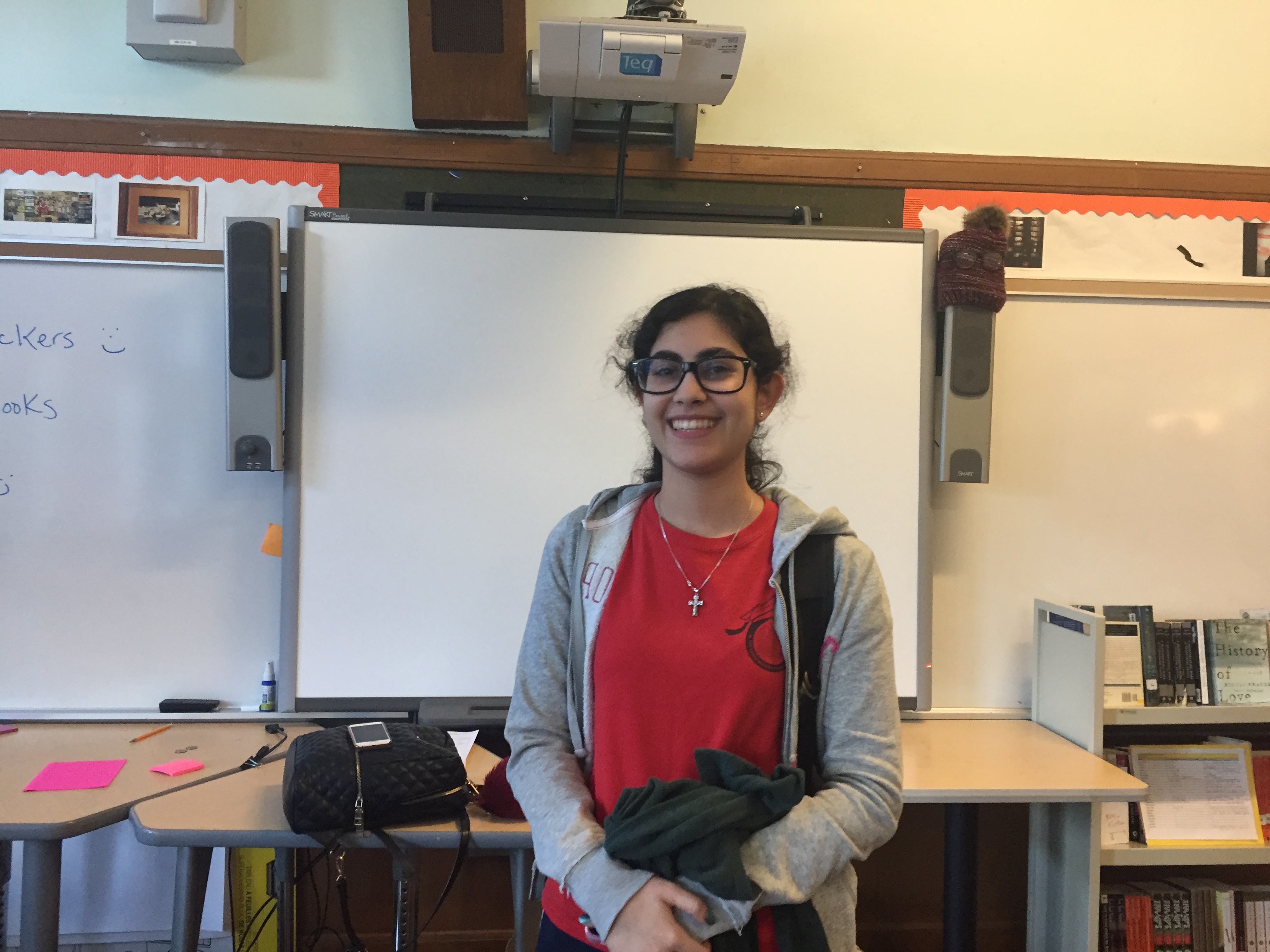Mastery Communications Week, from August 14-18, will surface resources, tools, and best practices for communicating about mastery-based learning to parents, and other community members. Several national organizations will share their thoughts, and we will hear from practitioners in their own words through a Q&A series. These two Q&As with Alondra and Triane, students from The Young Women’s Leadership School (TYWLS), shows how students experience the communications, and how they play a role in helping parents understand mastery.
Alondra C., 12th grade

“I really do prefer [mastery-based grading]. I find it so helpful. I don’t know how I would do at another school. An alumna [of TYWLS] came back and said that the way we are graded helped her in college. With her college assignments, she knows what the professor expects.”
1. What does mastery look like at your school?
When I first came to my school, mastery was hard to understand, especially for my mom. She was used to a totally different system—letter grades and percentages. We found it a little weird at first but we have both grown to like it.
At our school, whenever we do a project, we get a rubric. This is helpful because it breaks down what teachers are looking at. How can you fail when you get something like that? It always makes it clear what you need to do to get a certain grade. I find it especially helpful when writing an essay because there are really specific things teachers look for so it’s helpful to know what they are as we are writing.
2. How did you learn about mastery at your school?
In 6th grade, I didn’t pay as much attention to the rubrics. I started to really get it at the end of middle school. When we have a project or test, our teachers always tell us to look at our rubric to see how they’re grading us. Also, in student led conferences, instead of talking to the teacher, my mom talks to me about what it all means. This helped me learn it because I had to explain it to her. It was difficult for her but now she pretty much gets it.
3. How did your mom learn about mastery at your school?
One of the big things she would say was, “oh why does your average look like that? How can you get it higher?” Through our grading platform you don’t see things like how to get one more point. It’s more like: How can I fix this outcome to bring my average up? So, I explained how outcomes work and broke it down for her.
I also showed her a project in art and showed her two of the outcomes I got graded on: “create” and “communicate”. For the “create” outcome my teacher was looking for three things, and I had to include them in the project. So, then my mom understood: it’s not that I completed the project and my teacher thought it was good, it was that I demonstrated these skills through the project.
I also went through the rubric with my mom, which is kind of like a check list. As I did my project, the rubric was a check list.
4. What does your family think of mastery?
When I talked to my mom about it I tried to make it simple, so I wouldn’t go as deep as outcomes. I would say instead of getting number grades we got graded on whether we’re meeting the standards expected of us, or exceeding, or not there yet.
My teachers tell me exactly what they expect so I know what I need to do. I would be lost in my assignments if I didn’t know that.
Usually with certain things, like essays, there are similar outcomes and we know to expect. For example, now with the “collaborate” outcome, I don’t need to look at the rubric, I know what to do to exceed mastery there.
5. What advice do you have for principals and teachers who are thinking about how to communicate about their mastery at their school?
I do like how we have the 3 designations (meeting, exceeding, not there yet). But sometimes I feel like there is something missing. Though it is clear, sometimes, like in chemistry, you can be so close but you’re missing just one thing.
I would tell principals and teachers that just explaining mastery and going through the rubric with students, and asking if they have questions, is the best way to make sure students know about mastery. Tell them that the rubric is there to help them. It’s a list of what you expect from students on their projects, assignment, etc. Tell them it is meant to guide them.
For parents and students, I think an open mind helps. It’s not always easy to grasp the fact that, I’m not looking at my average but all the skills that make up my mastery grade. It takes time to get used to it. It takes repetition.

Q&A with Trianne H., 6th grade
1. What does mastery look like at your school?
So basically, mastery is skills that we need to learn based on outcomes like “communicate” and “collaborate”. The skills are specific about what we need to know and need to learn.
2. How did you learn about mastery at your school?
So before, like in 5th grade, the grading was just general and you just get a number. I wasn’t ever really sure what I needed to improve or what I needed to learn. With mastery, it’s very precise and helpful because now I know what I need to do to improve and master more skills. So, I have more information. We have exceeding standards, meeting standards, and not there yet. If, for example, I get “meeting standards”, I know I can improve and then I can do outcome recovery with that teacher. Similarly, I work on that outcome to gain more knowledge.
Once, in math, I had a “not there yet” on one of the outcome goals that I exceeded in advisory. My teacher gave me more work and showed me how to translate that skill and I got a better score in math.
3. What does your family think of mastery and how did they learn about it?
At first, they were confused. They didn’t understand the trimesters and the fact that we get an overall score for the trimester. My grade is not final until last day of school—it’s always going up and down. It’s not final so I can always improve on anything I need to until the last day of school. Even if it’s from early on in the year.
Throughout the year as my parents saw my grades online and how much I improved, they got it. My parents are used to the old system with grading numbers, but I really like our system.
4. Can you tell us a bit more about your grading system and what you like about it?
It’s basically is a grading system where you can see outcomes with the specific skills they relate to. We get grades on our homework, projects, and how we collaborate with peers.
Usually I look at my marks online around 2-3 times per month. It’s a lot of work to have teachers update it so they need time to make all the changes. I show my parents when I log on and explain the outcomes snapshot at end of trimester. It is kind of like report card. But it is not final. I can still change my grades.
5. What advice do you have for principals and teachers who are thinking about how to communicate about their mastery at their school?
I really liked Summer Bridge, so I think that they should do that. It was a week or two weeks and helped prepare incoming 6th graders. It was a good introduction. We talked a lot about mastery there because we were new to it. They showed us our online system and also seniors came in and showed us examples of their work and explained what it meant for them and how it helped them too.